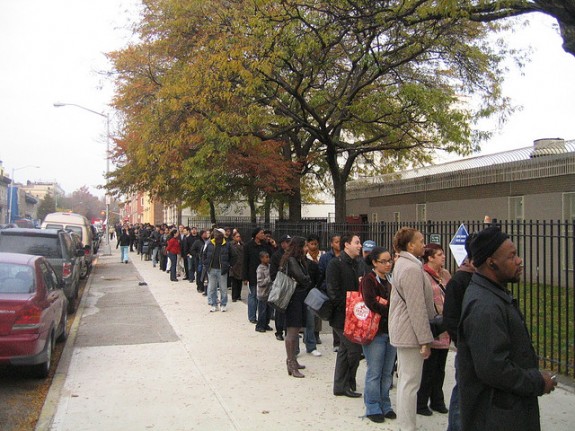
Voting at the polls in Florida hasn’t begun, but voters are already reporting problems. (Photo by Eliza Brown.)
By Ashley Lopez
Florida Center for Investigative Reporting
Floridians don’t begin voting at the polls until tomorrow, but already there are reports suggesting that voters and local officials are going to face a complicated, potentially problematic election.
Already, news outlets are reporting on some problem areas.
This year, absentee ballot requests in Florida are at an all-time high. Because lines are going to be longer than usual due to a historically long ballot in Florida, groups from both parties have been recommending that voter use absentee ballots.
But absentee ballots come with their own sets of problems. For one, there aren’t laws in place to safeguard against absentee ballot fraud, which is the leading type of voter fraud in Florida.
According to the Associated Press, mistakes are also more likely when voters use absentee ballots:
The rise in popularity of mail-in absentee voting around the country also increases the risk of mistakes, lost votes and even fraud, according to election experts and researchers. A recent study by the Caltech-MIT Voting Technology Project of California absentee votes over two decades found that they are twice as prone not to be counted as votes cast on more modern voting machines.
The study estimated that in 2008 as many as 21 percent of absentee ballots requested nationwide never made it back to elections officials to be counted. Although that number may be inflated and could include people who simply decided not to vote absentee after all, study co-author Charles Stewart III of the Massachusetts Institute of Technology said it still raises a red flag.
“We have possibly gotten way ahead of ourselves in encouraging people to vote by mail,” said Stewart, a political science professor. “It’s pretty clear that the improvement we’ve gotten by having better voting machines in the precincts may be given back by having more and more people voting at home.”
Barely 5 percent of the total vote nationwide 40 years ago, mail-in absentee voting accounted for 16 percent of ballots in the 2008 election and is forecast to easily surpass that level this year. Many states have removed requirements that voters give a reason for voting absentee, such as a foreign business trip or military service. Oregon and Washington now conduct entirely mail-in elections.
Much of the national debate on voter access this year has focused on such issues as whether a picture ID should be required at a polling place or whether ineligible people are improperly registered. But many experts say the chances for problems in the mail-in absentee system are much greater.
In Florida, voters will have to read through and vote on 11 long, confusingly worded amendments.
In fact, the ballot this year is long because some amendments are more than 600 words. Many voters will also go to the polls without any familiarity of these amendments.
The League of Women Voters of Florida says it’s gotten more than 1,000 calls from voters who are confused and frustrated over the 11 proposed state constitutional amendments on the Nov. 6 ballot.
League President Dierdre Macnab said on Thursday that the problem isn’t with the voters but with the Florida Legislature.
Macnab said the problem is a law the Legislature passed last year. It exempts amendments placed on the ballot by the Legislature from rules that citizens initiatives must follow. That includes court reviews of ballot titles and summaries to make sure they are clear and accurate and a 75-word limit on summaries.
Typically, in past elections, many voters were familiar with an amendment because citizen-led ballot measure campaigns have to collect signatures around the state for years and must educate the public before the proposed amendment even gets on the ballot.
However, with legislatively referred amendments, that isn’t the case — and this year all 11 ballot measures are legislatively referred.
Finally, voters in Florida are already facing several misinformation campaigns aimed at keeping them from the polls.
Because Florida is a swing state, voters here are more likely to face some type of fraudulent information. Think Progress reports that already Floridians have had to look out for two types of misinformation:
- Phone voting. Residents in Florida, Indiana and Virginia are receiving mysterious phone calls telling them they can vote by phone instead of going to the polls. Virginia’s board of elections has received at least 10 complaints, mostly from seniors, though the total number of people affected by these calls is unclear.
- Fake voter purge letters. Also in Florida, a mass mailing of fake letters questioning voters’ citizenship is being investigated. The letter, written on fake letterhead of a local county’s Supervisor of Elections, tells recipients in 23 counties to fill out a “voter eligibility form” with their Social Security information, Florida drivers licence number, and addresses. The letter claims the recipients must send the form to the Supervisor of Elections within 15 days or be purged from the rolls — mimicking actual purge letters ordered by Florida governor Rick Scott (R) challenging 200 Floridians’ citizenship.
It’s important to note that, despite all of this everyone, should vote and demand that their vote be counted.
Long lines should not dissuade anyone from voting. Just because some absentee ballots might have problems doesn’t mean no one should vote absentee. It is the job of every election official in the state to solve these problems, but it is also the job of the voter to be persistent and vigilant.
This is a big election, and Florida is in the middle of it.
